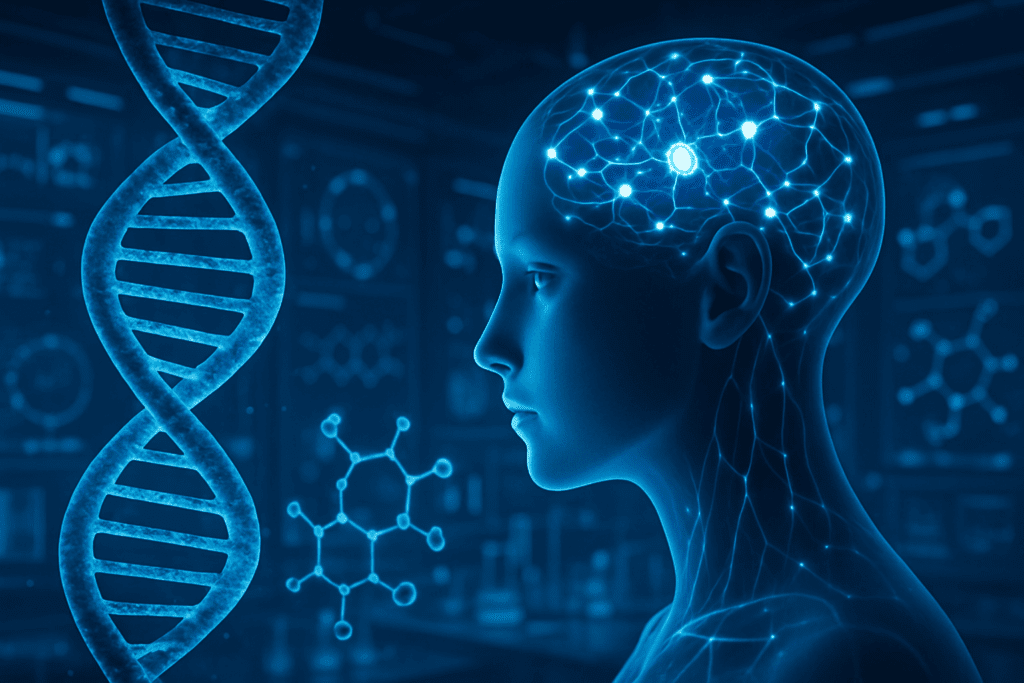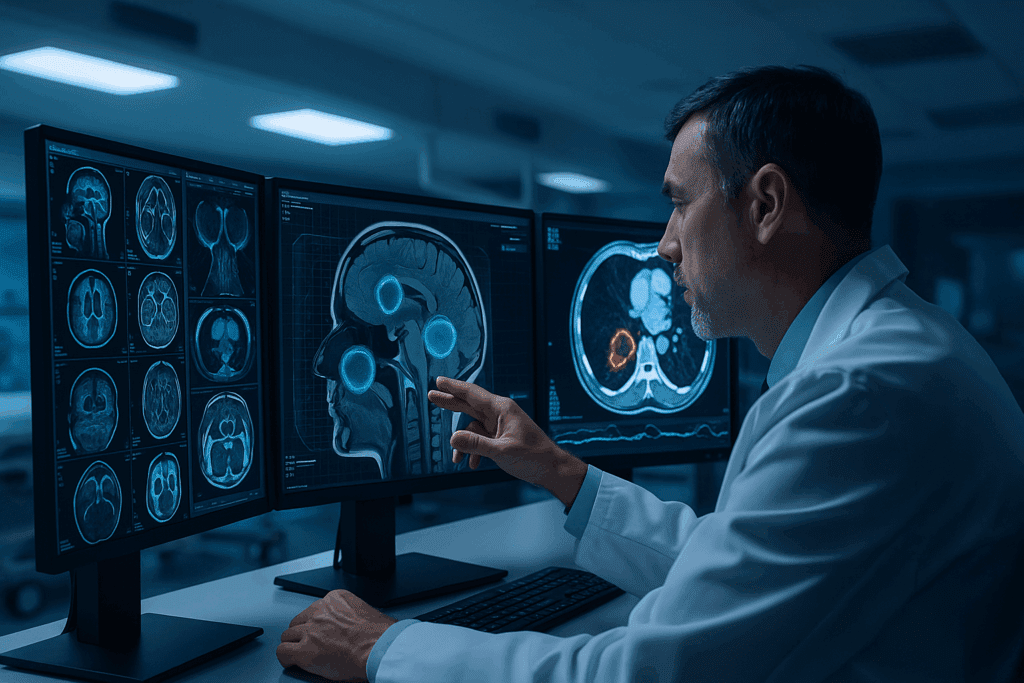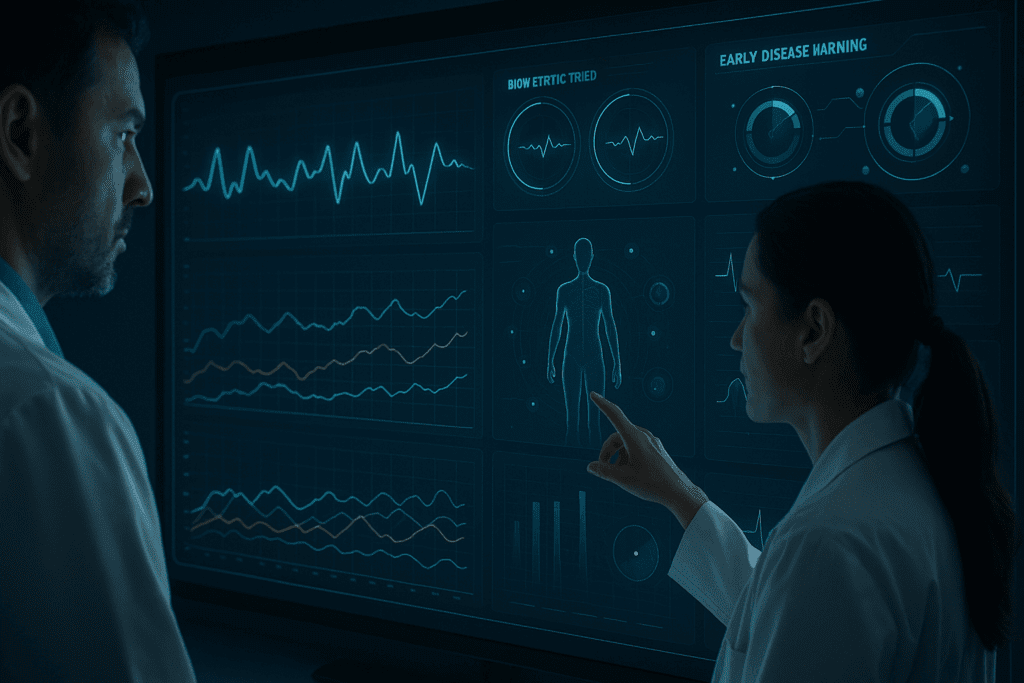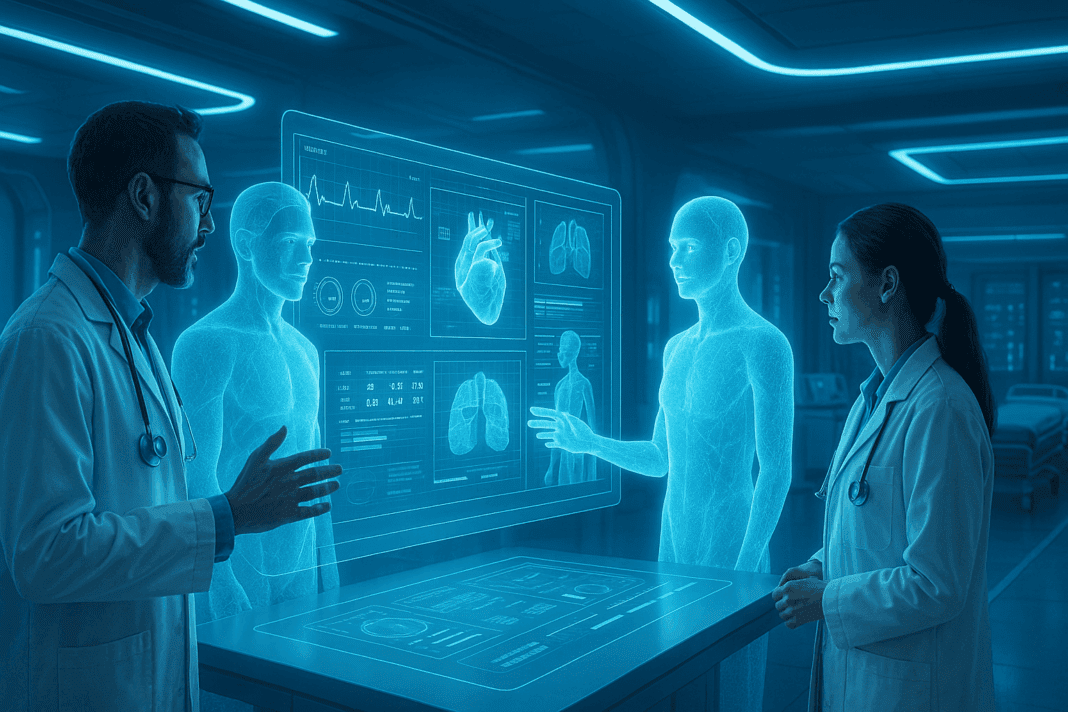Introduction: The Emergence of AI Trends in Healthcare
In recent years, the rapid acceleration of AI trends in healthcare has transformed the very foundation of medical research and clinical practice. Artificial intelligence, once relegated to the realm of futuristic speculation, now occupies a central role in driving groundbreaking innovations across diverse medical fields. From drug discovery to personalized treatments and predictive diagnostics, AI is redefining how healthcare professionals approach complex medical challenges. This surge in technological prowess not only reflects advancements in computing power but also a paradigm shift in how data-driven insights are leveraged to improve patient outcomes and streamline research methodologies. As we delve into this transformative landscape, it becomes evident that artificial intelligence trends in healthcare are setting the stage for a future where precision, efficiency, and accessibility converge like never before.
You may also like: Revolutionizing Healthcare: How AI in Medicine Is Enhancing Diagnosis, Treatment, and Patient Outcomes

The Foundation of Artificial Intelligence in Medical Research
To appreciate the profound impact of AI on healthcare, one must first understand its foundational elements. Artificial intelligence encompasses a suite of technologies including machine learning, natural language processing, deep learning, and computer vision. These technologies enable machines to simulate human cognitive functions, such as learning from data patterns, making decisions, and even predicting future outcomes. Within the context of healthcare, AI systems can analyze vast datasets far more quickly and accurately than human researchers, uncovering hidden patterns and correlations that would otherwise remain obscured.
One of the earliest applications of AI in medical research involved bioinformatics, where algorithms processed genomic data to identify gene-disease associations. This initial foray demonstrated the potential for AI to handle complex, multi-dimensional data, laying the groundwork for more sophisticated applications. Today, AI not only processes information but also generates hypotheses, assists in designing experiments, and supports clinical decision-making, marking a significant departure from traditional research methodologies.
Moreover, the integration of AI has led to the development of intelligent clinical trial design, where patient recruitment, stratification, and outcome analysis are optimized to reduce time and cost. These innovations exemplify how ai trends in healthcare are moving beyond theoretical constructs to tangible, impactful tools that shape real-world medical research endeavors.

AI Trends in Healthcare: Pioneering Drug Discovery and Development
Among the most exciting developments driven by AI trends in healthcare is the revolution in drug discovery and development. Traditionally, bringing a new drug to market required a timeline of 10-15 years and investments exceeding billions of dollars. The process was fraught with high attrition rates, with many promising compounds failing during clinical trials. AI has introduced a transformative efficiency into this arduous process.
By harnessing machine learning algorithms, researchers can now predict how different molecular structures will interact with biological targets, drastically reducing the time needed to identify viable drug candidates. Platforms such as Atomwise and Insilico Medicine utilize deep learning models to simulate molecular behavior, accelerating the identification of compounds with high therapeutic potential. These platforms analyze vast chemical databases, cross-reference biological data, and suggest novel molecules that may have gone unnoticed by human researchers.
Moreover, AI-driven predictive analytics help anticipate potential side effects and toxicity levels early in the development process. This foresight enables researchers to modify compounds or abandon unviable options before reaching expensive clinical stages. Consequently, the cost and duration of drug development pipelines are significantly reduced, making treatments more accessible and allowing pharmaceutical companies to allocate resources more effectively.
The application of artificial intelligence trends in healthcare in drug repurposing also deserves mention. AI algorithms can identify new uses for existing drugs, offering a quicker and less costly route to addressing unmet medical needs. This strategy not only optimizes resource utilization but also delivers therapeutic solutions to patients much faster, underscoring the profound societal benefits ushered in by AI.

Personalized Medicine: The New Frontier of AI-Enhanced Healthcare
Personalized medicine represents a profound shift from the “one-size-fits-all” model to tailored healthcare strategies based on individual genetic, environmental, and lifestyle factors. At the heart of this revolution lies the expanding influence of ai trends in healthcare. AI’s capacity to analyze complex datasets empowers clinicians and researchers to deliver highly customized treatment plans that maximize efficacy while minimizing adverse effects.
Genomic sequencing technologies generate immense volumes of data that, without AI, would be virtually impossible to interpret comprehensively. AI algorithms, particularly those utilizing deep learning, can sift through this genomic information to identify mutations, biomarkers, and patterns that inform personalized therapeutic approaches. For instance, in oncology, AI-driven models can predict tumor behavior, suggest targeted therapies, and even forecast patient response based on genetic profiles.
Beyond genomics, AI integrates data from electronic health records, wearable devices, and patient-reported outcomes to create a holistic view of an individual’s health status. Machine learning models can then recommend personalized prevention strategies, early interventions, and dynamic treatment adjustments, ensuring that care remains responsive to the evolving needs of each patient.
Importantly, the democratization of AI tools means that personalized medicine is no longer confined to elite research institutions. Community hospitals, outpatient clinics, and even telehealth platforms are beginning to harness AI-driven insights, broadening access to precision healthcare. This expansion highlights the crucial role that artificial intelligence trends in healthcare play in promoting equity and inclusivity within the healthcare system.

Diagnostic Excellence: How AI Trends in Healthcare Elevate Accuracy and Speed
Accurate and timely diagnosis is the cornerstone of effective medical care, yet diagnostic errors remain a significant source of morbidity and mortality worldwide. Here again, the transformative power of AI trends in healthcare is reshaping clinical practice, enhancing diagnostic precision, and reducing human error.
Radiology has emerged as one of the most prominent fields benefiting from AI integration. Deep learning models, trained on millions of imaging studies, can detect abnormalities such as tumors, fractures, and infections with remarkable sensitivity and specificity. In some cases, AI systems have demonstrated diagnostic accuracy on par with or even surpassing that of experienced radiologists. Tools like Google’s DeepMind Health and Zebra Medical Vision exemplify how AI is being deployed to interpret imaging studies rapidly and accurately, facilitating earlier intervention and better patient outcomes.
Beyond imaging, AI applications in pathology, dermatology, and ophthalmology are flourishing. AI algorithms can analyze histopathological slides, skin lesion images, and retinal scans, offering diagnostic support that enhances clinical decision-making. Furthermore, AI-assisted diagnostic platforms are increasingly integrated into primary care settings, empowering general practitioners with advanced tools to detect conditions early and refer patients for specialist care when necessary.
It is crucial to note that AI does not replace clinicians but rather augments their capabilities. By automating routine tasks and flagging anomalies, AI frees healthcare providers to focus on complex cases requiring nuanced clinical judgment. In this collaborative model, AI becomes an indispensable ally in elevating the overall quality and efficiency of healthcare delivery.

Predictive Analytics and Preventive Healthcare: A New Paradigm
The transition from reactive to proactive healthcare has long been a goal for medical professionals and policymakers alike. Thanks to artificial intelligence trends in healthcare, predictive analytics is becoming a powerful tool to anticipate health risks, implement preventive strategies, and ultimately improve population health outcomes.
Predictive models built on AI analyze a multitude of variables, including genetic predispositions, environmental exposures, lifestyle choices, and socio-economic factors, to assess an individual’s risk for developing various conditions. This risk stratification enables targeted interventions, ranging from lifestyle modifications to pharmacologic prophylaxis, before clinical symptoms manifest.
For example, AI-driven algorithms can predict the likelihood of cardiovascular events by analyzing subtle changes in vital signs, laboratory results, and imaging studies. Similarly, in oncology, predictive analytics can identify patients at high risk of cancer recurrence, guiding the intensity and frequency of follow-up care. These applications not only enhance individual patient outcomes but also optimize resource allocation within healthcare systems.
The COVID-19 pandemic underscored the value of predictive analytics, as AI models forecasted infection trends, healthcare resource needs, and the effectiveness of public health interventions. Going forward, the integration of predictive analytics into routine healthcare practice promises to shift the focus from disease management to disease prevention, a transformation made possible by ongoing advances in ai trends in healthcare.

Ethical Considerations in the Age of AI-Driven Healthcare
As the influence of AI in healthcare continues to expand, so too do the ethical considerations surrounding its use. Issues related to data privacy, algorithmic bias, transparency, and informed consent must be carefully navigated to ensure that the benefits of AI are realized without compromising fundamental ethical principles.
Patient data serves as the lifeblood of AI systems, necessitating robust safeguards to protect sensitive information. Regulatory frameworks such as the General Data Protection Regulation (GDPR) in Europe and the Health Insurance Portability and Accountability Act (HIPAA) in the United States establish guidelines for data handling, but the dynamic nature of AI technologies demands continuous vigilance and adaptation.
Algorithmic bias presents another significant challenge. AI models trained on datasets that lack diversity may produce biased outputs, potentially exacerbating healthcare disparities. Addressing this issue requires intentional efforts to curate representative datasets and implement bias mitigation strategies throughout the development lifecycle.
Transparency and explainability are also critical. Clinicians and patients alike must understand how AI-derived recommendations are generated to build trust and facilitate informed decision-making. Explainable AI (XAI) frameworks aim to bridge this gap, offering insights into the logic and reasoning behind algorithmic outputs.
Finally, the role of human oversight cannot be overstated. While AI systems provide invaluable support, ultimate responsibility for clinical decisions must reside with qualified healthcare professionals. By maintaining a human-in-the-loop approach, healthcare systems can harness the power of AI while safeguarding ethical standards.
The Future Outlook: How AI Trends in Healthcare Will Shape Tomorrow’s Innovations
Looking ahead, it is evident that ai trends in healthcare will continue to drive profound transformations across all domains of medicine. Emerging areas such as AI-assisted robotic surgery, personalized vaccine development, and mental health diagnostics via natural language processing represent just a fraction of the possibilities on the horizon.
Furthermore, the convergence of AI with other cutting-edge technologies, including blockchain, 5G, and quantum computing, promises to unlock even greater potential. Blockchain can enhance data security and interoperability among AI systems, 5G will enable real-time AI-powered telemedicine services, and quantum computing may exponentially accelerate drug discovery and complex diagnostic modeling.
Educational institutions, research centers, and healthcare organizations must adapt to this evolving landscape by investing in AI literacy and interdisciplinary collaboration. Training the next generation of healthcare professionals to understand and leverage AI tools will be essential for maximizing their positive impact.
As society continues to grapple with the challenges and opportunities presented by AI, ongoing dialogue among stakeholders—including clinicians, patients, policymakers, and technologists—will be vital. Together, they can ensure that artificial intelligence trends in healthcare are harnessed responsibly, ethically, and effectively, paving the way for a future where medical miracles are not only possible but commonplace.
Frequently Asked Questions: Breakthrough Insights on AI Trends in Healthcare
1. How Are AI Trends in Healthcare Influencing Clinical Decision-Making?
AI trends in healthcare are reshaping clinical decision-making by providing physicians with more comprehensive, data-driven insights. Beyond assisting with diagnosis, AI systems can recommend evidence-based treatment options tailored to individual patients, factoring in genetic information, comorbidities, and lifestyle factors. These recommendations are not designed to replace physicians but to enhance the decision-making process, particularly in complex cases. Physicians can use AI as a second opinion, helping to reduce diagnostic errors and optimize therapeutic strategies. As artificial intelligence trends in healthcare evolve, they will increasingly support real-time clinical decision-making across diverse medical specialties.
2. What Role Do AI Trends in Healthcare Play in Addressing Global Health Inequities?
One of the most promising impacts of AI trends in healthcare is their potential to reduce health inequities globally. AI-powered mobile diagnostics and telemedicine platforms can bring sophisticated healthcare services to underserved rural areas where specialists are scarce. Additionally, AI models trained on diverse datasets can help create culturally sensitive treatment recommendations. This is critical because traditional healthcare approaches often overlook socio-economic, genetic, and environmental factors unique to different populations. Thus, as artificial intelligence trends in healthcare continue to mature, we can expect more equitable access to life-saving interventions worldwide.
3. How Will Artificial Intelligence Trends in Healthcare Transform Mental Health Treatment?
Artificial intelligence trends in healthcare are poised to revolutionize mental health care through early detection, personalized interventions, and ongoing monitoring. AI-driven platforms can analyze speech patterns, social media activity, and biometric data to identify early signs of depression, anxiety, or other mental health issues before they become critical. Furthermore, machine learning models can tailor therapy plans based on individual patient profiles, predicting which interventions are most likely to succeed. AI-powered chatbots and virtual therapists are also becoming valuable tools for immediate support, offering confidentiality and accessibility. These innovations promise a future where mental health care is proactive, personalized, and available anytime.
4. Can AI Trends in Healthcare Improve Post-Surgical Recovery Monitoring?
Yes, AI trends in healthcare are playing an increasingly significant role in post-surgical care. Smart wearables and AI algorithms can monitor patients’ vital signs, mobility, and wound healing remotely, enabling healthcare providers to detect complications before they become severe. AI systems can also analyze trends in recovery data to predict which patients might benefit from additional interventions, physical therapy adjustments, or nutritional changes. Real-time feedback improves patient adherence to recovery plans and provides reassurance, reducing readmission rates. By personalizing post-operative care, artificial intelligence trends in healthcare are enhancing recovery outcomes and patient satisfaction.
5. What Challenges Do AI Developers Face When Implementing AI Trends in Healthcare?
Despite rapid advancements, integrating AI trends in healthcare presents several challenges. Data silos between hospitals, laboratories, and research institutions can limit access to the large, diverse datasets needed for effective AI training. Additionally, ensuring that AI models remain unbiased and transparent is complex, especially when dealing with sensitive patient data. Regulatory hurdles and varying compliance standards across countries further complicate the deployment of AI solutions. Moreover, convincing clinicians to adopt AI tools requires building trust and demonstrating tangible benefits through rigorous clinical validation. Overcoming these challenges is critical for realizing the full potential of artificial intelligence trends in healthcare.
6. How Are AI Trends in Healthcare Impacting Medical Education and Training?
AI trends in healthcare are reshaping medical education by introducing future clinicians to cutting-edge technologies early in their training. Medical schools and residency programs are increasingly incorporating courses on machine learning, data analytics, and AI ethics into their curricula. Simulation platforms powered by AI allow students to practice diagnostic and surgical skills in risk-free virtual environments. Additionally, AI-driven educational tools can personalize learning experiences, adapting to a student’s strengths and weaknesses. As artificial intelligence trends in healthcare advance, future healthcare professionals must be equipped to work alongside intelligent systems to deliver optimal patient care.
7. In What Ways Are AI Trends in Healthcare Advancing Predictive Genomics?
AI trends in healthcare are dramatically advancing predictive genomics by improving our ability to forecast disease risk based on genetic profiles. Machine learning algorithms can analyze complex genetic datasets to identify patterns and mutations linked to diseases such as cancer, diabetes, and rare genetic disorders. Predictive genomics powered by AI allows for earlier interventions and personalized preventive strategies tailored to an individual’s unique genetic makeup. Moreover, AI enhances the scalability of genomic research, enabling broader population studies that were once unmanageable. As artificial intelligence trends in healthcare continue to progress, predictive genomics will become a standard tool in preventive medicine.
8. What Is the Impact of AI Trends in Healthcare on Pandemic Preparedness?
The COVID-19 pandemic demonstrated the vital role that AI trends in healthcare can play in pandemic preparedness and response. AI models predicted outbreaks, modeled viral spread, and accelerated vaccine development by analyzing massive biological and epidemiological datasets. In the future, AI will help monitor global health patterns in real-time, detect anomalies that could signal emerging pathogens, and optimize resource distribution such as vaccines and ventilators. Additionally, AI can support rapid contact tracing and public health messaging tailored to specific demographics. Strengthening pandemic resilience through artificial intelligence trends in healthcare is now a major priority for global health organizations.
9. How Are AI Trends in Healthcare Being Used to Improve Patient Empowerment?
AI trends in healthcare are shifting the healthcare paradigm from provider-centric to patient-centric models. Mobile apps, wearable technologies, and AI chatbots empower patients to take active roles in managing their health. For example, continuous glucose monitors combined with AI algorithms provide real-time advice to diabetic patients, helping them make informed lifestyle choices. Additionally, personalized health dashboards allow individuals to track vital signs, medication adherence, and physical activity levels. This self-management fosters greater patient engagement, leading to better health outcomes and improved satisfaction. As artificial intelligence trends in healthcare evolve, patient empowerment will become a defining feature of modern medicine.
10. What Future Innovations Can We Expect From AI Trends in Healthcare?
Looking ahead, AI trends in healthcare will fuel groundbreaking innovations that extend far beyond today’s applications. We can anticipate AI-driven organ regeneration using 3D bioprinting technologies, where algorithms design functional tissue structures tailored to individual patients. Another emerging frontier is emotion-sensing AI in palliative care, enabling sensitive, real-time adjustments in patient support services. Additionally, AI will likely facilitate decentralized clinical trials, allowing patients to participate remotely with the help of smart devices and virtual monitoring. As artificial intelligence trends in healthcare intersect with advances in nanotechnology, robotics, and neuroengineering, the boundaries of medical possibility will continue to expand exponentially.
Conclusion: Embracing the Transformative Power of AI Trends in Healthcare
In conclusion, the integration of ai trends in healthcare into medical research and practice marks a transformative era characterized by unprecedented possibilities. From revolutionizing drug discovery to personalizing treatment plans, enhancing diagnostic accuracy, and shifting the focus toward prevention, AI is reshaping the very fabric of healthcare delivery.
By embracing the powerful insights offered by AI while upholding the principles of ethical responsibility, transparency, and inclusivity, the medical community can ensure that technological progress translates into tangible benefits for all. The future of healthcare lies at the intersection of human ingenuity and artificial intelligence, where collaboration and innovation coalesce to drive breakthroughs that once seemed beyond reach.
As we stand on the precipice of this new frontier, it is clear that artificial intelligence trends in healthcare will continue to inspire, challenge, and ultimately revolutionize the ways we understand, study, and improve human health. The journey is just beginning, and the possibilities are as limitless as our imagination.
Further Reading
The AI-Powered Healthcare Experience


